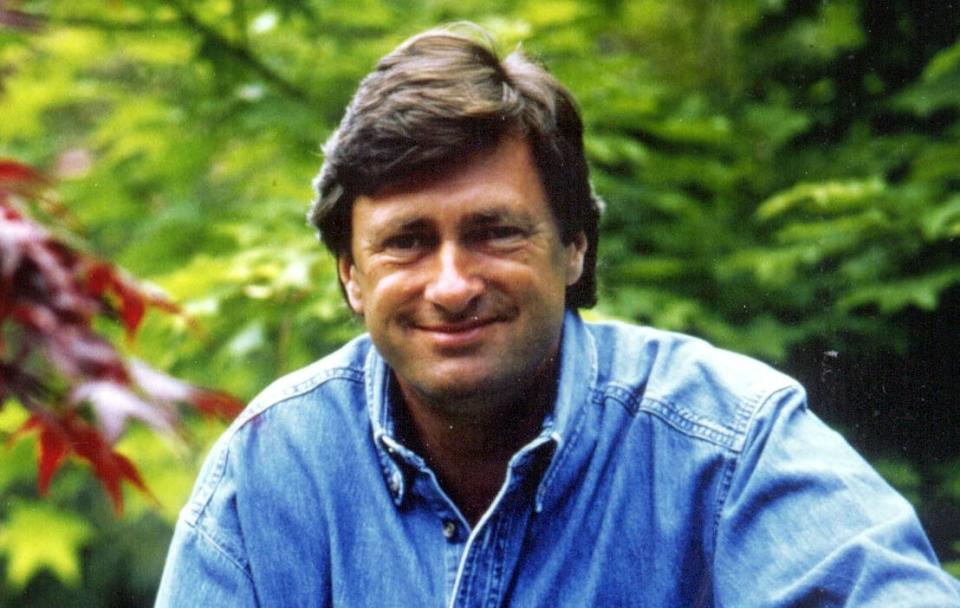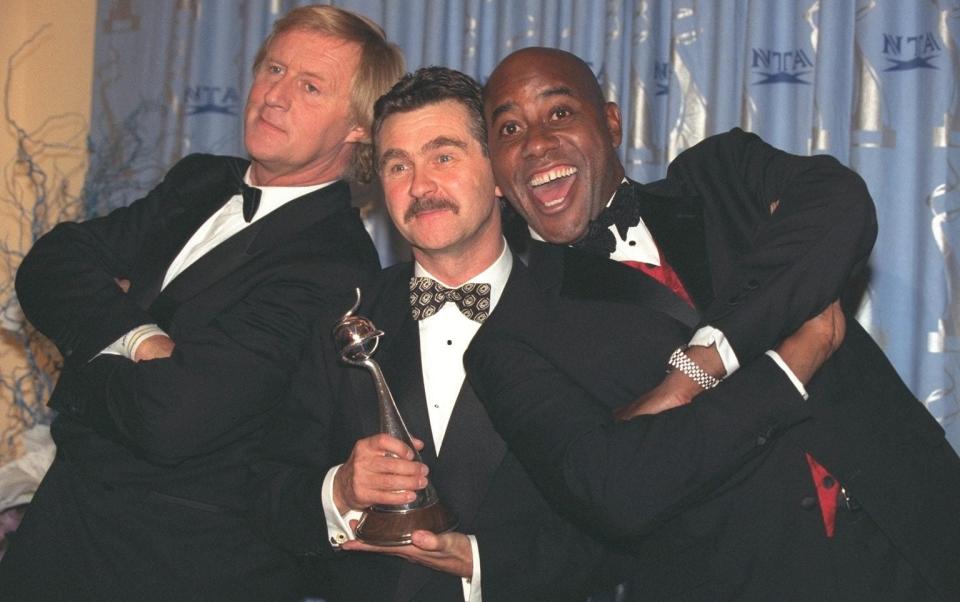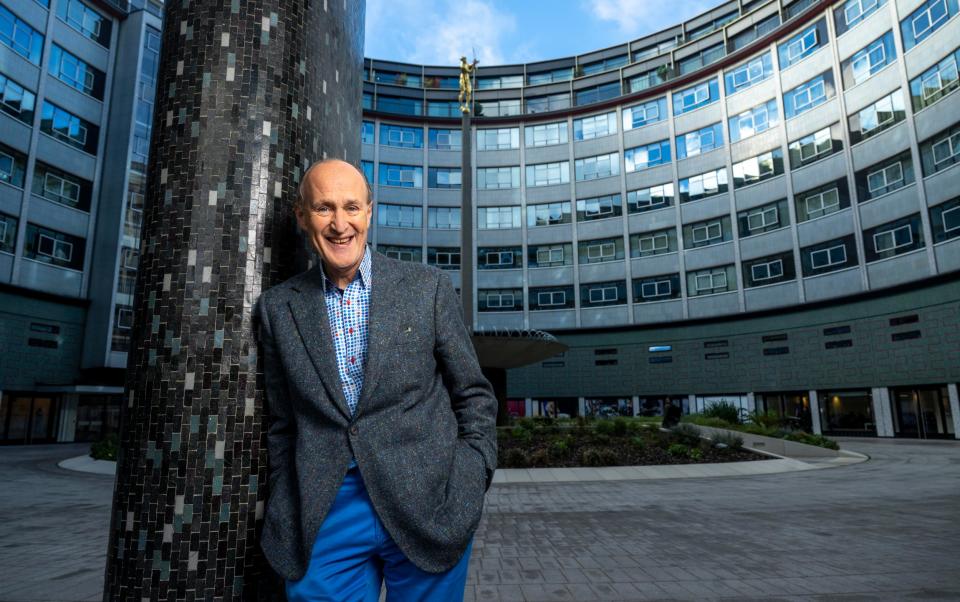Sir Peter Bazalgette: ‘The BBC is full of people trying to be impartial and present the truth’

When the original stars of the first Big Brother series went into “the house”, they had no idea of the fame and fortune that awaited them once they had enjoyed their “This-is-Davina-please-do-not-swear” moment. As the first ever “reality” TV stars in an era that predated social media, they couldn’t be certain anyone was even watching – let alone guarantee celebrity status once the closed-circuit cameras stopped rolling.
Yet as the nation continues to be gripped by the antics of Matt Hancock and his fellow contestants on I’m a Celebrity… Get Me Out of Here – which draws to a close this weekend – it seems that the reality TV format has managed to retain its controversial appeal, even if it may have lost some of its innocence. Hancock’s presence has helped to push viewing figures past the 10 million mark.
For Sir Peter Bazalgette, the man credited with “inventing” reality TV, the former health secretary’s involvement is more about politics than entertainment. “He clearly decided to go in as soon as he was snubbed by Rishi Sunak outside Downing Street,” says the former president of the Royal Television Society. “But I don’t watch reality TV. It’s too much of a busman’s holiday.”
From the new-found popularity of Love Island – a revival of an earlier celebrity series of the same name – to the news that Big Brother is to be remade by ITV, our love of seeing real-life dramas unfold on-screen appears undiminished. For many, these shows provide an escape route from endless talk of global warfare, climate change, economic crisis and political unrest.
As he steps down as chairman of ITV after six years in the role and nine years on the board, 69-year-old Bazalgette believes that the renaissance of some of the shows he created more than two decades ago shows just how hard it is to come up with a brand new ratings winner.
When he launched Big Brother in the UK in 2000, he was blamed for bringing “a plague to British broadcasting”, with TV critic Victor Lewis-Smith accusing him of “doing more to debase television over the past decade than anyone else”. As the Evening Standard pointed out at the time, Joseph Bazalgette had built the Victorian sewer system to remove filth from people’s homes and here was his great-great-grandson seemingly reversing the process.
Whether you like or loathe his unique brand of dumbed-down TV, there is no doubt that the former chairman of Endemol has created a formula that broadcasting bosses have been trying to emulate ever since.
As we chat in a dressing room at the iconic Television Centre in west London, he gleefully describes the appeal as a “makeover magic” that dates back to the days when Blue Peter presenters would make all manner of items out of a Fairy Liquid bottle, some sticky back plastic and a couple of pieces of wool.
“You’d see it happen live, in front of your eyes,” he says, before referring to the shows he came up with in the late 1990s and 2000s. “Ready Steady Cook, Changing Rooms and Ground Force are all makeover magic and the roots of those shows is Blue Peter.”

Almost a quarter of a century on, it is easy to forget how groundbreaking – and headline-grabbing – these shows were when they first went to air. Take Changing Rooms, launched in 1996, which saw neighbours challenged to make over each other’s homes in two days with the help of a team of experts, including Laurence Llewelyn-Bowen and Linda Barker.
Three episodes in, and Bazalgette recalls being at the centre of a media storm after one contestant complained about how the flamboyant Llewelyn-Bowen, famed for his love of flock wallpaper, had encouraged her best friend to redecorate her bedroom in shades of pink with bras suspended from the walls. “It was all over the front pages of the newspapers and I was on breakfast telly,” he laughs. “I have never forgotten the News of the World headline: ‘BBC turned my house into a tart’s boudoir’.”
So successful that it moved to primetime BBC One at the height of its popularity, Changing Rooms attracted up to 10 million viewers. Not bad for an idea that was cooked up just minutes before it was pitched to Michael Jackson, then controller of BBC Two.
“We had brainstormed an idea that wasn’t very good. We got on the Central line at Tottenham Court Road to go and see Jackson with this not very good idea and I turned around to Ann [Booth-Clibborn, his co-producer], and said: ‘This idea sucks, doesn’t it?’ We had about eight stops before we got to TV Centre in White City to get it right.
“When we got to Holland Park tube station, I turned to her and said: ‘What would it be like if we got next-door neighbours to swap houses and do up each other’s rooms?’ I don’t know why that idea came into my head but it was under supreme pressure. And so we went in and pitched that – and because we had already had some success Jackson said, ‘Yes, I’ll have a pilot of that’. We staggered to the lift and said: ‘What have we just sold?!’”
By then, Bazalgette had already proved a ratings winner with Ready Steady Cook – an against-the-clock budget cookery show presented by Fern Britton from 1994 to 2000. Having produced more than 3,000 episodes of the BBC’s Food and Drink programme, he hit upon the idea of pitting chefs against each other to cook with a £5 bag of ingredients bought by an audience member acting as a sous-chef. The show’s unprecedented success not only spawned a new era of cookery shows but also saw Bazalgette credited with the invention of the so-called “celebrity chef”.
“It’s been written that I started the idea of the celebrity chef because, in 1984, I got Anton Mosimann out of the Dorchester to cook Sunday lunch for a lorry driver for his budget of five quid,” he explains. “That film, which later became a full documentary, was so popular that about 1 in 30 people watching the show, which was about five million, wrote in for the recipe.
“That’s why I went on to create Ready Steady Cook and Can’t Cook, Won’t Cook. Food is not just a human need, there’s comfort in it. It’s a cultural symbol. People love it. Cooking for someone else is an act of cherishing.”

As with Changing Rooms, however, getting the show on the box was far from plain sailing. “We did three different pilots with three different presenters,” reveals Bazalgette. “Getting celebrity chefs like Ainsley Harriott and Brian Turner wasn’t a problem because I’d worked with them all on Food and Drink and knew they were all telly-friendly. But I couldn’t get the ending right.
“Originally, I think we had the winner getting their supermarket shopping paid for the week and the loser receiving a wooden spoon, but it just didn’t work. That’s when we came up with the idea of having a red pepper and a green pepper team and asking the audience to vote by holding up either a green or red pepper sign at the end.
“The only time I sat in the audience was with the mother of a friend of mine. The floor manager kept on telling us: ‘Don’t hold the sign the wrong way up.’ Of course, I was the only person who got it wrong; the inventor of the show.”
BBC One revived Ready Steady Cook in 2020, with Rylan Clark-Neal presenting, but it was axed after just two series.
After he had popularised food and DIY shows, Bazalgette then turned his attention to gardening. Once again, though, he admits that he “got the concept right but not the format”. Bazalgette was inspired by an advertisement for Qualcast mowers showing suburban gardeners competing for the best stripes on their lawn. “I had this idea of next-door neighbours competing for a garden makeover. So I stuck Alan Titchmarsh on a Wimbledon umpire’s chair overlooking either side of the fence. And we made this show but it wasn’t very good.”
When research suggested that what viewers really wanted was gardening tips from Titchmarsh, Ground Force was born. “I thought, let’s get a husband, wife and family to go away for the weekend – I was thinking particularly of gardens that were bombsites – and then have Alan in to do the practical gardening, and a big reveal at the end.” The hugely popular series, attracting 12 million viewers at its peak, made stars of the likes of Charlie Dimmock and Tommy Walsh – as well as being credited with skyrocketing sales of decking. Retailer B&Q saw sales of decking rise from £5,000 in 1997, when the show was first aired, to £16 million in 2001.
But it was Big Brother that would prove to be Bazalgette’s biggest success. Having sold his production company to Endemol in 1998, the former BBC News graduate trainee, who had cut his TV teeth on Esther Rantzen’s That’s Life, found himself at the helm of a Dutch company that had pioneered a new broadcasting concept: continuously monitored live TV.
Taking its name from George Orwell’s 1949 novel Nineteen Eighty-Four, Big Brother had already aired in Holland, Germany and Spain when Bazalgette and his team chose 11 complete unknowns to live in a specially-built house on an island in London’s East End and have TV viewers watch their every move for nine weeks, before televoting to evict them, one by one, and to crown an eventual winner.
“It could have been a complete disaster,” he admits. “We had to build a city to make it. It was a massive outlay of money, with a huge budget. The worry wasn’t that it was going to be a flop – it was more a case of, would it be controversial and get into trouble?”
Inevitably, the show did become the subject of intense press attention, gaining particular notoriety after one housemate, “Nasty” Nick Bateman, was ejected from the BB House for breaking the rules.
“People had very strong opinions about it,” he reflects. “Some people found it shocking, that’s why the stakes were high. Big Brother created a constitutional crisis in Malawi, a religious crisis in Bahrain, a regulatory crisis in Germany, and an advertising crisis in Mexico.
“But what makes me smile now, 22 years later, is that while nearly every other country had a sort of amorous or sexual scandal, we didn’t. We had a class scandal. We had the public schoolboy, ‘Nasty Nick’, being defeated by the working-class hero Craig [Phillips]. It was a case of no sex please, we’re British!”
When Phillips, a bricklayer from Liverpool, ended up giving his £70,000 winnings to his friend Joanne Harris, who had Down's syndrome, to pay for her heart and lung transplant – the ends seemed to justify the means.
Yet the programme was not without its future controversies – with the likes of Jade Goody accused of racism towards her fellow contestant Shilpa Shetty and another celebrity version witnessing George Galloway, dressed as a cat, lapping milk from a saucer while being stroked by actress Rula Lenska. “All everyone ever wanted to know is, is it faked? They couldn’t believe there were such strong storylines but, of course, none of it was scripted.”
Describing Goody, who died of cervical cancer in 2009, as “very clever” – despite her perceived lack of decorum and intelligence – Bazalgette concedes that “the difference between when I produced Big Brother in 2000 and today is social media.”
The death of Love Island host Caroline Flack in 2020 – along with increased awareness of the mental health problems that can plague contestants who are nobodies one minute, and celebrities the next – has called into question the morality of reality TV. Is it cruel? “Not really,” says Bazalgette. “It’s consensual and it’s very carefully produced. And there are even stronger duty-of-care protocols today than there ever was.” On Big Brother’s planned revival, due to be broadcast next year, he says simply: “Good luck!”
Endemol went on to make the game show Deal or No Deal, trebling its value while Bazalgette was chairman, before he stepped down in 2007. Awarded a Bafta fellowship in 2000, the man whose first taste of TV was watching Robin Hood on a neighbour’s set was appointed president of the Royal Television Society from 2010 to 2017 and chairman of Arts Council England from 2013 to 2017. Still a fierce advocate of the arts, the characteristically snappy dresser describes the recent decision to strip English National Opera, of which he was also chairman, of £12 million in funding, as “devastating”.
Once described as “the most influential man in British television”, what does he think of the state of TV today? “Never been better,” he grins, noting how expenditure on content by domestic broadcasters has increased from £2.6 billion to £3 billion in the past three years. “In 2003, our exports of finished programmes were about £350 million a year, now they are about £1.3 billion a year. We have about 50 per cent of the world trade in entertainment formats, which is fantastic. So British TV punches above its weight internationally.”

A strong advocate for the BBC retaining its licence fee, Bazalgette argues in his capacity as co-chair of the Creative Industries Council that the national broadcaster is central to the growth of a sector that accounts for about 6 per cent of the economy.
Of BBC bias, he adds: “I started working in BBC News in 1977 and I’ve heard criticism of BBC bias every year over the last 45 years. Of course, people in the news make mistakes and they’re held to account by their own management and by the regulator Ofcom. But on the whole the BBC is full of people trying very hard to be impartial, get to the truth and present it honestly.”
He also bats away criticism that current affairs have had to make way for talent shows such as X Factor and Britain’s Got Talent. “These shows have a fantastic story arc because you get a number of competitors, you boil them down one at a time. People have got emotional involvement in them because they can vote and take part. These shows are a more reliable ratings-winning human drama. So I think there has been a shift from documentaries to reality TV. I don’t regret it.”
Not that Bazalgette actually watches any reality TV at the home he shares in Notting Hill with his wife Hilary Newiss, a former intellectual property lawyer. Neither of the couple’s grown-up children have followed him into TV, although his son works in film and his daughter is in organisational design. “I tend to watch a lot of news,” he says, “and a lot of drama”. He singles out Steven Knight’s SAS Rogue Heroes and Disney+’s The Old Man as recent binge-watches.
Despite being an avid fan of The Frost Report, The Man From Uncle and Monty Python, Bazalgette had no plans to go into television when he was younger, studying law at Cambridge University before being urged to be a barrister by his stockbroker father and pianist mother. “I think my father always thought I should get a serious job,” he says. As it turned out, the sale of his production company to Endemol netted him millions.
I wonder whether there is a particular programme he wishes he had made. Without missing a beat, he declares: “Antiques Roadshow! It combines everything: national history, personal family history, a big reveal and, ultimately, greed. And it’s so participatory, because we all sit at home saying, ‘Oh it must be worth five grand or 300 quid’ or whatever, and we’re quite often wrong.
“We are storytelling animals,” he continues. “We tell stories, and we need to hear stories because telling stories and hearing stories is how we make sense of our lives. That’s what reality TV is all about. We watch it because what life is really about is human relationships.”

 Yahoo Movies
Yahoo Movies 